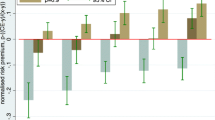Abstract
The prospect theory model developed by Daniel Kahnemann and Amos Tversky in 1979 is now widely recognized as providing more empirically valid explanations of decision-making under uncertainty than the classical von Neumann-Morgenstern paradigm of expected utility maximization. However, despite compelling potential use cases, industry applications of prospect theory remain scarce. Following an outline of the shortcomings of classical expected utility theory and some key tenets of prospect theory, we discuss how prospect theory can be used in practice to obtain meaningful estimates of investor risk preferences. We then conclude with a case study of the digital investment management firm LIQID and its use of prospect theory as a decision support tool for its clients.
Access this chapter
Tax calculation will be finalised at checkout
Purchases are for personal use only
Similar content being viewed by others
Literature
Allais, M. (1953). Le Comportement de L’Homme Rationnel Devant Le Risque: Critique Des Postulats et Axiomes de L’École Americaine. Econometrica, 21, 503–546.
Bachmann, K. K., De Giorgi, E. G., & Hens, T. (2018). Behavioural finance for private banking: From the art of advice to the science of advice (2nd ed.). Hoboken: Wiley.
Briggs, R. (2017). Normative theories of rational choice: Expected utility. In Stanford encyclopedia of philosophy (Spring 2017 ed.). Stanford: Metaphysics Research Lab, Stanford University.
Frederick P. Brooks, J. (1995). No silver bullet—Essence and accident in software engineering. In J. Frederick P. Brooks (Ed.), The mythical man-month, anniversary edition with 4 new chapters (pp. 1069–1076). Amsterdam, NL: Elsevier Science B.V.
Kahnemann, D., & Tversky, A. (1979). Prospect theory: An analysis of decision under risk. Econometrica, 47(2), 263–292.
Markowitz, H. M. (1952). Portfolio selection. Journal of Finance, 7, 77–91.
Quinn, W. S. (1990). The puzzle of the self-torturer. Cham: Springer.
von Neumann, J., & Morgenstern, O. (1953). Theory of games and economic behavior. Princeton, NJ: Princeton University Press.
Author information
Authors and Affiliations
Corresponding author
Editor information
Editors and Affiliations
Rights and permissions
Copyright information
© 2019 The Author(s)
About this chapter
Cite this chapter
Lisson, C. (2019). Using Prospect Theory to Determine Investor Risk Aversion. In: Liermann, V., Stegmann, C. (eds) The Impact of Digital Transformation and FinTech on the Finance Professional. Palgrave Macmillan, Cham. https://doi.org/10.1007/978-3-030-23719-6_6
Download citation
DOI: https://doi.org/10.1007/978-3-030-23719-6_6
Published:
Publisher Name: Palgrave Macmillan, Cham
Print ISBN: 978-3-030-23718-9
Online ISBN: 978-3-030-23719-6
eBook Packages: Economics and FinanceEconomics and Finance (R0)




